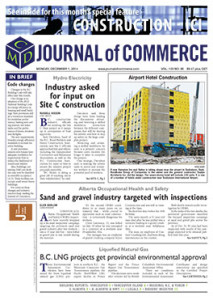Called a Method, Apparatus and System for Testing the Self-Sealing Capabilities of a Concrete Sample, the test quantifies and proves the self-sealing properties of concrete to which a mix of specialty chemicals — either Kryton’s proprietary compounds or those of a competitor — has been added.
“The test is important because it validates in the lab the self-sealing properties of concrete with a Kryton admixture,” said Kevin Yuers, a vice-president at Kryton and one of the inventors of the test. “We had known from work in the field that the waterproofing admixture in our products enabled cracks to self-seal, but we also wanted to prove it in the lab.”
Concrete that can self-seal any cracks that develop in it reduces long-term maintenance and repair costs and extends the lifespans of infrastructure and buildings, he said.
It also reduces the risk of aged bridges and overpasses collapsing suddenly.
“Much of our infrastructure is deteriorating,” Yuers said. “When it was built in the last century, it was designed to last 50 years. But today we expect it to last at least 100 years, if not longer.”
Concrete by its nature is prone to cracking. Worse, cracks that appear early can grow over time.
After cracks appear, moisture and harmful chemicals can enter the concrete, damaging it and the metal rebar inside.
The severity of the damage can be limited by the inherent self-sealing property of concrete, by which cracks of limited width can seal themselves on their own over a period of time.
Kryton’s line of concrete waterproofing products uses a proprietary blend of the company’s Krystol chemicals. When added to concrete, Krystol chemicals act as a catalyst to create a reaction that causes long, narrow crystals to form, filling the pores, capillaries and hairline cracks of the concrete mass.
As long as moisture remains present, crystals continue to grow throughout the concrete, reaching lengths of many inches over time.
After the concrete has cured, the crystalline chemicals sit dormant until another dose of water, possibly through a new crack, causes the chemical reaction to begin all over again.
It is this ability to reactivate in the presence of water that gives Krystol-treated concrete the ability to self-seal. Another inventor of the technology, Rishi Gupta, who is an assistant professor of civil engineering at the University of Victoria, is continuing his research on concrete admixtures.
“We are experimenting with different fibres that can be added to concrete,” he said.
Gupta is testing the sealing abilities of concrete as varying amounts of fibres, such as industrial waste like fly ash and wood cellulose, are added to the mixtures.
Gupta says his work is also environmentally friendly.
“Concrete is associated with being unsustainable, because every tonne of cement produces about another tonne of carbon dioxide,” he said.
“If you can make your structure last longer, you’veactually made the material more sustainable.”
To measure the lifespan and strength of the concrete he has helped to create, Gupta will also be using existing technical instruments in new ways.
He is testing the strength of concrete by sending electrical currents through it and measuring its resistance with electrical resistivity meters. Conventional concrete strength measurements involve chloride permeability tests that can take up to 10 hours for a single reading, or drilling into the structure and removing a concrete sample.
Gupta is also using a laser scanning vibrometer, a hand-held infrared device that can determine the strength of a structure from heat signals it sends out.
If a concrete structure is cracked, the device can detect the break from its thermal structure.
“The ultimate goal of all my research is to make concrete structures that are stronger and more durable,” he said.

